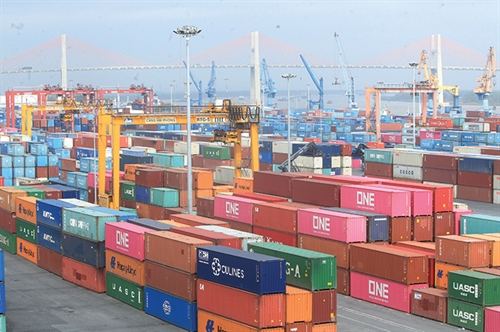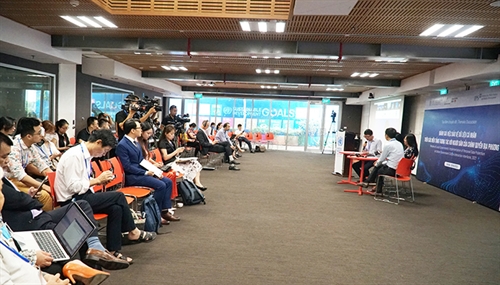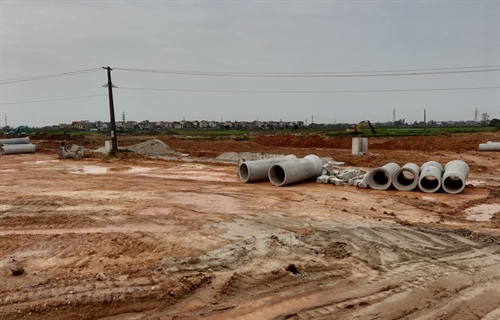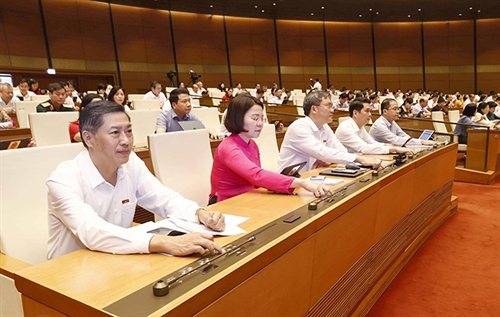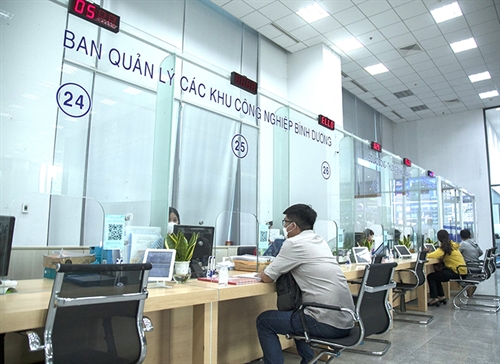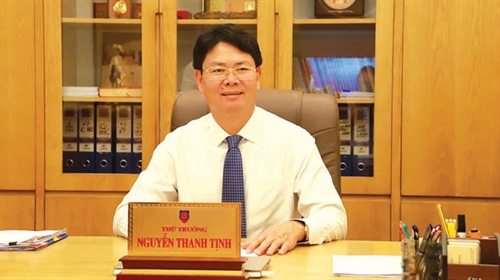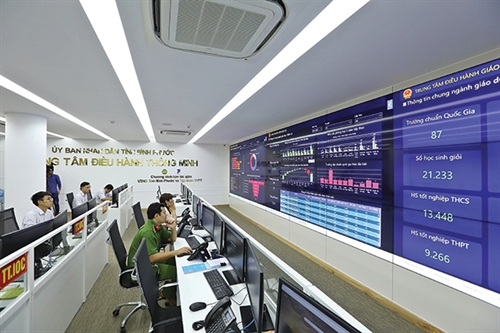On June 16, 2022, the fifth plenum of the 13th Party Central Committee adopted Resolution 18/NQ-TW on continuing to renew and improve institutions and policies to raise the effect and efficiency of land management and use, creating the motive force for our country to become a high-income developed country. Below are excerpts of the Resolution.
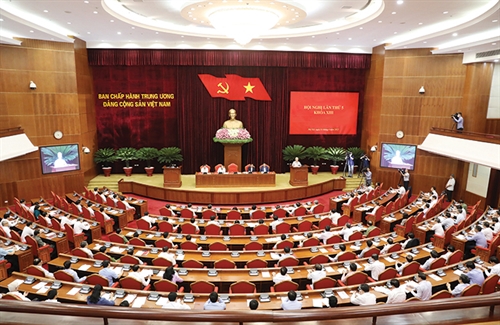 |
| A plenary session of the fifth plenum of the 13th Party Central Committee Photo: Phuong Hoa/VNA |
| Photo: Phuong Hoa/VNA |
VIEWPOINTS
Firstly, land belongs to the all-people ownership, with the State acting as the owner’s representative and performing the unified management. The State exercises the owner’s rights through deciding on land use master plans and plans; recovering land, allocating land, leasing land, recognizing land use rights, permitting land repurposing and setting land use terms; deciding on land prices; and deciding on policies to regulate the added value from land not created by land users. The State recovers land for national defense and security purposes and for socio-economic development in the national and public interests under law, ensuring fairness, publicity, transparency and enhanced accountability. Land management and use must guarantee the common interests of the entire people; the people are assisted to access and use land in a fair, public, efficient and sustainable manner.
The State performs the unified management of land based on national territory in terms of area, quality, economic, cultural and social value, national defense, security and environment; reasonably assigns responsibilities among central state agencies and, at the same time, ensures appropriate and efficient decentralization of powers to local authorities and intensifies inspection, supervision, control, and handling of violations.
Secondly, land use rights constitute a special type of property and goods but are not the ownership rights; the rights to use land and land-attached assets are protected by law. Land users have the right as well as the obligation to use land in accordance with law. The State shall neither recognize the reclamation of the land areas allocated in the process of implementing land policies and laws nor readjust the agricultural land areas already allocated to households and individuals; and promptly adopts appropriate policies to ensure the most effective exploitation and use of agricultural land.
Thirdly, land institutions and policies must be improved in synchrony and conformity with the institutions on development of a socialist-oriented market economy. Appropriate policies will be applied to different land users and forms of land use so as to unlock the potential of land resources to the utmost; land-related corruption, negative practices and complaints, and land speculation and wasteful use must be resolutely redressed.
Fourthly, to heighten the effect and efficiency of state management of land. To modernize the land management work and land-related public services. To consolidate and complete the land management apparatus to be downsized, effective, efficient, centralized, synchronous and unified. To raise the role and capacity of justice bodies in settling land-related complaints, denunciations and disputes. Land must be surveyed, assessed, inventoried, quantified and fully accounted in the economy; and be planned for efficient and rational use with long-term visions, ensuring harmony of interests between generations, zones and regions, and between socio-economic development and national defense and security maintenance; educational, cultural and sports development; environmental protection and adaptation to climate change; and assurance of national food security. The past and emerging weaknesses and obstacles in land management and use must be properly settled.
Fifthly, to enhance the Party’s leadership, and promote the role of the Vietnam Fatherland Front, socio-political organizations and the people in the formulation, implementation, and oversight of the implementation of land policies and laws.
OBJECTIVES
General objectives
To improve institutions and policies on land management and use in synchrony and conformity with the institutions on development of a socialist-oriented market economy. Land resources must be managed, exploited and used in the most thrifty, sustainable and efficient manner to meet the requirements of industrialization, modernization, and social justice and stability; national defense and security maintenance; environmental protection and adaptation to climate change, thus creating the motive force for turning Vietnam into a high-income developed country. The real estate market, including the land use rights market, will become a channel for rational, fair and efficient land distribution.
Specific objectives
By 2025: By 2023, to complete the revision of the 2013 Land Law and relevant laws, ensuring their synchrony and consistency. To complete the establishment of a centralized, uniform, synchronous, multi-purpose and connected national digital database and information system on land. To strengthen the land-related state management apparatus to be streamlined, effective, efficient, synchronous and unified; to eliminate intermediaries and appropriately step up the division and decentralization of powers together with the mechanism of power inspection, supervision and control. To basically settle existing shortcomings and problems related to the management and use of land from state-run agricultural and forestry farms; land for national defense and security purposes in combination with production and economic development purposes; land of production establishments or non-business units already relocated from major cities; land from sea encroachment; land for religious purposes; cemetery land; multi-purpose land; residential land, and production land for ethnic minority people.
By 2030: To basically complete the system of land laws in synchrony, consistency and conformity with the institutions on development of a socialist-oriented market economy. To definitely address the wasteful use, non-use, pollution and degeneration of land and other problems in land management and use.
TASKS AND SOLUTIONS
Unifying the awareness about land management and use in the socialist-oriented market economy among officials, Party members and the people
Party Committees and organizations, administrations, the Vietnam Fatherland Front and socio-political organizations must step up public communication and education activities for officials, Party members and the people to correctly and fully understand that land belongs to the entire-people’s ownership with the State acting as the owner’s representative and performing the unified management, especially the rights and obligations of the State in the capacity as the owner’s representative as prescribed in the Constitution and law; and the rights and obligations of organizations, households and individuals that are assigned land use rights by the State. As an enormous resource, land should be efficiently and sustainably managed and used, ensuring the social justice; and not be left degenerated, destroyed, wasted and affected by acts of corruption and negative practices.
Improving the land management and use institutions and policies in synchrony with the institutions on development of a socialist-oriented market economy
The focus is to amend, supplement and improve the 2013 Land Law and relevant legal documents, ensuring their synchrony and consistency and meeting the new development requirements, specifically as follows:
To renew and improve land use master plans and plans
National master plans as well as land use master plans and sectoral master plans involving land use must ensure conformity, uniformity, synchrony and close connection for mutual development. Land use master plans and plans will be formulated at national, provincial and district levels to meet the requirements of materializing the Strategy for fast and sustainable socio-economic development; national defense and security maintenance; environmental protection and adaptation to climate change. Land use master plans must have contents on norms of various land categories with land use space and zoning, and natural ecosystems, presenting information on every land plot. The determination of land use norms must conform to land use demands, avoiding waste in land distribution, management and use. It is required to provide explicit and strict regulations on approval and issuance of annual land use master plans. The State ensures sufficient resources for the formulation of land use master plans and sectoral master plans involving land use.
To complete regulations on land allocation, lease and repurposing
To allocate and lease land mainly through auction of land use rights and bidding for land-using projects. To provide specific regulations on auction of land use rights and bidding for land-using projects; to limit and strictly regulate cases of land allocation or land lease not through auction of land use rights or bidding for land-using projects, ensuring publicity and transparency with synchronous and concrete mechanisms for handling violations.
Basically, the annual land rental payment method will be applied while cases of lump-sum land rental payment should be specified to suit the nature and purposes of land use, ensuring stable sources for and avoiding loss of state budget revenues. The State will assign land quotas without collecting land use levy with regard to land areas used as worshipping institutions and offices of religious organizations. Religious organizations using land for other purposes shall pay land rentals to the State in accordance with law. The conditions on land allocation or land lease as well as land use quotas for religious organizations will be set in conformity with available land areas of localities.
To intensify the management and control of the repurposing of land, particularly land for rice cultivation, land of protection forests, land of special-use forests, land of production forests being natural forests, land of equitized state enterprises and state-divested enterprises, and multi-purpose land; to step up the decentralization and delegation of powers in couple with examination, supervision and administrative reform in land repurposing.
To complete regulations on compensation, support, resettlement and land recovery for national defense and security purposes; and socio-economic development in the national and public interests
Land recovery must comply with the Constitution and law and may be carried out only after the compensation, support and resettlement plans are approved. For cases of land recovery requiring resettlement, the resettlement must be completed before the land recovery. The compensation, support and resettlement must be carried out one step ahead, ensuring publicity, transparency and harmony between the interests of the State, the people having land recovered and investors in accordance with the Constitution and law; specific regulations on compensation, support and resettlement must be issued so that the people having land recovered have domiciles with their living conditions equal to or better than those in their former houses. Vocational training, job creation and production reorganization must be carried out efficiently to stabilize the lives of the people having land recovered. To continue pilot separation of compensation, support and resettlement projects from investment projects for early implementation.
To define more specifically the competence for, purposes and scope of land recovery, and specific conditions and criteria of land recovery by the State for socio-economic development in the national and public interests. To continue applying the mechanism of mutual agreement between the people and enterprises in the transfer of land use rights for execution of urban and commercial housing projects. To improve the organizational apparatus, operation mechanism and financial mechanism applicable to land fund development organizations, ensuring that they are streamlined, efficient, fully capable of forming, managing and using land areas, and properly performing the tasks of compensation, support and resettlement upon land recovery by the State.
To provide specific regulations on the use of land areas in vicinity of infrastructure facilities according to land use master plans and plans and the priority policy permitting the people with their residential land recovered to be allocated land or buy homes on the expanded areas of the recovered land in accordance law. For socio-economic development projects conformable with land use master plans and plans, it is necessary to formulate and complete mechanisms and policies so that organizations, households and individuals with land use rights can join investors in project implementation in the form of transfer or lease of, or contribution of capital with, land use rights.
To provide the mechanism on contribution of capital with land use rights to and readjustment of land areas for projects on urban development or embellishment and rural residential areas. To work out specific and synchronous sanctions for handling cases of non-use or delayed use of land already allocated or leased by the State. To resolutely recover improperly used land areas of organizations, state agencies and non-business units, particularly those in advantageous locations with high profitability to prevent the loss of state capital and assets.
To improve the land-pricing mechanism
To abolish land price frames; to apply mechanisms and methods of land pricing according to market principles, and define the functions, tasks and responsibilities of agencies tasked to determine land prices. The central government will formulate criteria for and the process of examining and overseeing localities in the formulation of land price tables. Provincial-level People’s Councils will decide on, inspect and oversee the application of, land prices. To work out an effective mechanism for raising the quality of land pricing, ensuring the independence of land price appraisal councils, the capacity of land pricing consultancy organizations, and the capacity and ethics of persons in charge of land pricing. To supplement and complete regulations relating to land price publicity, compulsory transactions via exchanges, and via-bank and cashless payment; to severely handle violations, etc.
To complete land-related mechanisms and financial policies
Land-related financial policies must ensure harmony of the interests of the State, land users and investors; to work out mechanisms for reasonable and efficient regulation of revenue sources from land use levy and land rentals between the central and local governments; to study and formulate policies to regulate land rental differences, ensuring publicity and transparency. To review policies and laws on agricultural and non-agricultural land use tax, and formulate policies and laws on land use tax in conformity with international practices and the country’s development level, specific conditions and appropriate roadmaps. To impose higher tax rates on people using multiple land plots and homes, speculating land, delaying land use or leaving land unused. To apply land tax, land use levy and land rental incentives suitable to the sectors or geographical areas eligible for investment incentives; for poor households, ethnic minority people, families with meritorious services to the revolution; and localities planned for production to ensure national food security and protect forests, particularly protection forests and special-use forests.
To improve regulations relating to the real estate market, including the land use rights market
To step up the commercialization of land use rights. To establish a system of information on the real estate market in association with land information; to work out policies to promote the development of the land use rights market, particularly the agricultural land lease market. To improve legal bases for and increase non-cash payment in real estate transactions. To work out mechanisms for sound, secure and sustainable development of the real estate market; to strictly control and redress land speculation.
To improve mechanisms and policies on agricultural land management and use
To increase subjects eligible for and quotas of agricultural land use rights transfer in conformity with the characteristics and conditions of each region and locality and with the restructuring of occupations, jobs and labor in rural areas. To create favorable conditions for agricultural land users to repurpose land for crop and livestock production, raising the use efficiency of agricultural land according to relevant master plans. To intensify the management of land quality and redress land degeneration and deterioration problems.
To formulate regulations on banks leasing agricultural land. To work out appropriate mechanisms and policies on, and organize the take-back of contracted but unused land from agricultural and forestry companies for local administrations’ management, and allocate or lease such land according to regulations as suitable to the conditions of each locality, region or zone. To apply appropriate policies on prioritized allocation of production land to ethnic minority people, together with application of effective mechanisms to prevent the transfer of such land.
To formulate regulations on management and use of multi-purpose land
To supplement and complete regulations on management and use of land for national defense and security purposes on the basis of reviewing the pilot implementation of a number of policies in order to remove hurdles and problems in the management and use of land for national defense and security concurrently serving production and economic development activities. To supplement regulations on residential land or agricultural land also used for commercial and service purposes, and land under tourist projects involving spirituality. To prescribe the regime on use of land for construction of overhead works and underground facilities and land from sea encroachment.
Stepping up administrative reform and digital transformation in, and building the capacity of, state management of land
To step up digital transformation in land management and use; to allocate rational resources for building and timely completing the national information system and database on land; to ensure the centralized and unified information management, operation, connection and sharing from the central to local levels. To apply the compulsory registration of land use rights and land-related changes while implementing specific and complete sanctions to stop transactions not registered at state agencies.
To strengthen the system of central and local land management agencies to be downsized, stable, unified, effective and efficient; to step up the application of modern technologies to land management. To step up the decentralization and delegation of powers in exercising the right of representing the all-people owner of land, performing the unified management toward heightening the responsibility of localities and the inspection, supervision and strict control by the central government; to reduce contact points and intermediaries in association with administrative reform, reducing harassments and negative practices. To further improve and raise the capacity of public service organizations in the field of land. To apply investment mechanisms and policies on preferential treatment and professional training for land management officials and civil servants; to upgrade physical facilities to meet the modern management requirements.
To concentrate investment resources for land resource survey and assessment; land statistics and inventory; land use supervision; soil quality protection, rehabilitation and restoration for strict quantitative and qualitative management of land serving the formulation of land use master plans and plans as a basis for sustainable land use.
Renewing and intensifying inspection, examination, supervision, and handling of violations; settling land-related disputes, complaints and denunciations; tightening discipline and order, preventing and combating corruption and negative practices
To renew and intensify the Party’s examination and supervision and the State’s inspection, examination, supervision and control in the formulation, issuance and enforcement of land-related mechanisms and policies; to settle land-related disputes, complaints and denunciations; to intensify the prevention and fighting of corruption and negative practices in land management and use. To enhance the control of powers, regularly examine, oversee, inspect and audit land management and use, and promptly handle breaches of the land law; to tighten discipline and order, and prevent and fight land-related corruption and negative practices. To examine and inspect the responsibility of sectors and authorities to settle complaints and denunciations on the guiding principle that land-related disputes are absolutely settled right at the grassroots level but not transferred to the central authority before being heard by local authorities.
Focusing on fundamentally settling prolonged limitations, weaknesses and shortcomings relating to land management and use
To concentrate investment resources, resolutely directing and raising the responsibility of central agencies and local administrations in handling limitations, weaknesses and shortcomings related to land of state-run agricultural or forestry farms; land of production facilities and non-business units already relocated from big cities; land recovered from equitized state enterprises and state-divested enterprises; and multi-use purpose land; to auction land use rights when restructuring state-owned working offices for the purpose of economic development in conformity with the approved land use master plans and plans; to allocate residential land and production land to ethnic minority people under land use master plans and plans; to settle problems and hurdles in land management and use.
Enhancing the Party’s leadership, and promoting the role of the Vietnam Fatherland Front, socio-political organizations and the people in land management and use
To renew forms and contents of, and step up the public communication and education about the land law, raising the awareness and sense of observance of the land law for officials, Party members, the people and enterprises. Party Committees and organizations and administrations, especially their heads, will concentrate efforts on leading and directing the formulation and enforcement of land policies and laws, be accountable for violations and self-seeking acts committed by organizations and individuals under their respective management, which cause land loss and waste.
To enhance the oversight role of the National Assembly, People’s Councils, the Vietnam Fatherland Front, socio-political organizations and the people; to detect and promptly report problems, inadequacies and violations in implementing land policies and laws for prompt settlement.-
